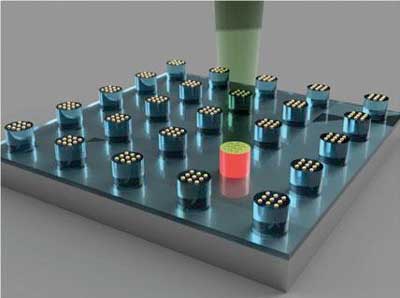Nanowerk December 18, 2018
A team of researchers in the US (Northwestern University, AFRL at Wright-Patterson AFB) supports the efficacy of a potentially revolutionary new tool developed at Northwestern University to rapidly test millions (even billions) of nanoparticles to determine the best one for a specific use. The tool utilizes a combinatorial library, or megalibrary, of nanoparticles in a very controlled way. The libraries are created using Mirkin’s Polymer Pen Lithography (PPL) technique, which relies on arrays with hundreds of thousands of pyramidal tips to deposit individual polymer “dots” of various sizes and composition, each loaded with different metal salts of interest, onto a surface. Once heated, these dots are reduced to metal atoms forming a single nanoparticle at fixed composition and size. Millions of features can be packed into square-centimeter areas, creating a path for making the largest and most complex libraries. The team used the tool to find Au3Cu as a new catalyst for synthesizing single-walled carbon nanotubes…read more. TECHNICAL ARTICLE

Apart from the structure, all the FPS-related optomechanical components are COTS, making the system a very low-cost solution. Credit: https://doi.org/10.1117/1.OE.58.4.041605